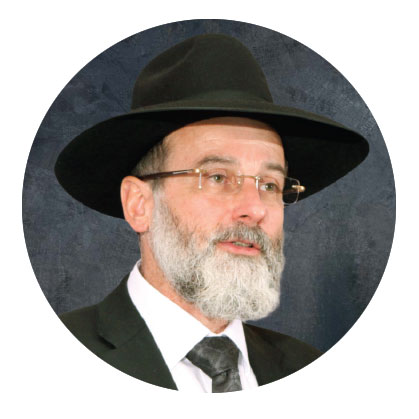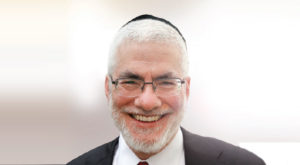Sensation Nation?


I
n today’s open society a person can have access to the entire world in the palm of his hand. Within minutes we are updated — whether it’s chalilah a terrorist attack in Eretz Yisrael a police shooting inAmerica another ISIS rampage inEurope or a juicy piece of news in our own communities.
Let us momentarily assume that all of this information is not in and of itself prohibited by the Torah. It is not immorality it is not taavos it is not lashon hara… it is just news from around the world that we absorb as we go about our daily lives.
Is this overabundance of information good for us? Are these graphic images good for our neshamos?
A fascinating insight in this week’s parshah sheds light on this question. The Torah discusses the command to destroy an ir hanidachas an idolatrous city and not have any benefit from the booty: “No part of the banned property may adhere to your hand so that Hashem will turn back from His burning wrath and He will give you mercy and be merciful to you and multiply you” (Devarim 13:18).
The Torah first warns us not to take any spoils from the city and then promises that Hashem will grant us mercy. What is the connection between the two?
Furthermore why specifically after destroying a city and its inhabitants — an act that would seem to be the diametric opposite of mercy — does the Torah tell us that Hashem will bless us with mercy?
The Ohr HaChaim Hakadosh derives a profound lesson from this pasuk.
Engaging in war and destruction naturally breeds cruelty in a person. Killing the inhabitants of an entire city can dull the innate rachmanus in the hearts and minds of those engaged in the Torah’s mandate to destroy the ir hanidachas. Therefore the Torah reassures us that Hashem the Source of mercy will bestow upon the destroyers the power of rachamim and nullify the cruelty that would normally be engendered in them by such conduct.
It is clear that being exposed to cruelty and repulsive behavior on a constant basis has an extremely detrimental effect on us.
There is a related lesson to be learned from the juxtaposition of the parshah of sotah to the parshah of nazir. The Gemara asks “Why do the laws of the nazir immediately follow the laws of the sotah? This teaches us that a person who witnesses the disgrace of a sotah should take a vow of abstinence from wine” (Brachos 63a).
At first glance this assertion is highly puzzling. Why should a person who witnessed the degradation of the sotah need to abstain from wine — a measure undertaken to minimize the likelihood of sin? Shouldn’t the spectacle of the sotah’s horrific punishment be a sufficient deterrent? In fact the Torah itself implies that merely publicizing a sinner’s punishment is sufficient to discourage others from sinning as the pasuk states (Devarim 21:21) “All of Israel shall see and be afraid.” How much more so should witnessing the sinner’s punishment serve as a deterrent!
The explanation is that everything we see and hear has an impact on us. Just seeing that such a sin was done that it is possible to engage in such reprehensible conduct automatically connects us with that conduct — even as we disparage the behavior and are disgusted by the act.
Seeing the sotah brings us one step closer to immorality than we were before. That is why the Torah tells us to abstain from wine after witnessing the sotah’s punishment in order to distance ourselves from the frivolity that leads to such transgressions.
There is however another vital and often-overlooked reason to avoid exposure to negative or even just extraneous news. We said earlier that every time we see something we become connected to it. If we become connected to it by definition we become disconnected from Hashem. Every connection to something extraneous from Torah and mitzvos even something that is not prohibited detaches us and disconnects us from Torah and mitzvos — our ultimate connection to Hashem.
Shlomo Hamelech compares our relationship with Hashem to the relationship between husband and wife. Rav Shimshon Pincus explains that a home cannot be built without privacy. So too privacy between the Jew and Hashem is a prerequisite for building a proper relationship with Him. Anything extraneous even if it is not in and of itself a sin will automatically serve as a point of detachment and disconnection from Hashem.
Rav Pincus gave a powerful mashal to illustrate this concept. Imagine a chassan and kallah entering the yichud room after the chuppah. As they sit down they suddenly notice the custodian sweeping the floor. They look at him and he looks at them and excuses himself: “Don’t mind me I am just sweeping the floor. I won’t bother you.” Of course they respond “You are bothering us. Even if you are just going about your business your presence here means there is no yichud no privacy.”
When we are hyperconnected to the world when every time something happens we receive a message a picture a hyperlink a Tweet or a Facebook posting — even if everything is kosher — it nevertheless acts as a barrier to our bond with Hashem. This makes it so much more difficult to learn Torah to daven and to make Hashem an integral part of our lives.
The bottom line is that everything to which we are exposed — even if it repulses us — makes a lasting impression on us. That impression is not benign — not only because it gets in the way of other more important impressions but also because these notions and actions enter the realm of possibility and over time attain a measure of acceptability. The Torah is adamant that everything from the ir hanidachas is prohibited even spoils that are not directly related to the idol worship because anything that originates in the world of idol worship will make an impression on us and will connect our hearts and souls with the city of idol worshipers.
Today’s media thrives on sensationalism. In order to achieve higher ratings the secular media is constantly crafting shocking headlines to grab our attention. The more media options there are out there the more they try to engage you to the point of distraction. Even the weather reports have been infected by sensationalism.
We are affected by the world around us and this trend toward increased sensationalism has sadly affected frum media as well.
Jewish websites are full of irresponsible sensationalist material and this phenomenon has affected our print media as well albeit to a lesser extent. All kinds of topics that in the not-too-distant past were never found in our publications now not only appear in print but also become conversation points at the Shabbos table and therefore part of our lives. They thus attain a measure of de facto acceptability.
Just a small anecdote to illustrate this point. Many years ago a prominent frum publication published an entire issue on the topic of “Kids at Risk.” The editor with whom I had a close relationship told me that they had agonized over whether it was appropriate to discuss the issue in such a public venue for fear that it would engender similar behavior. Only after extensive consultation with leading rabbinical authorities who themselves carefully weighed all sides of the issue was the decision made that there was a need to publish that issue.
The point is that much contemplation and consultation must take place before airing sensitive topics in a public forum. Any attempt to sensationalize the difficult and heartrending issues facing our communities in an effort to gain greater market share is the height of irresponsibility.
The lesson from the ir hanidachas and from the sotah is that exposure to even the possessions of idolaters or to the mere concept of immorality makes a deep and lasting impression on our neshamos. Such exposure must therefore be minimized or at best handled with utmost caution.
Let us resolve even as we live in a world of hyperconnectivity to recognize what all this exposure is doing to us and our avodas Hashem and banish harmful gratuitous sensationalism from our midst.
Rav Dovid Hofstedter is the founder and nasi of Dirshu and mechaber of the Dorash Dovid seforim on the Torah and Moadim.
Oops! We could not locate your form.













